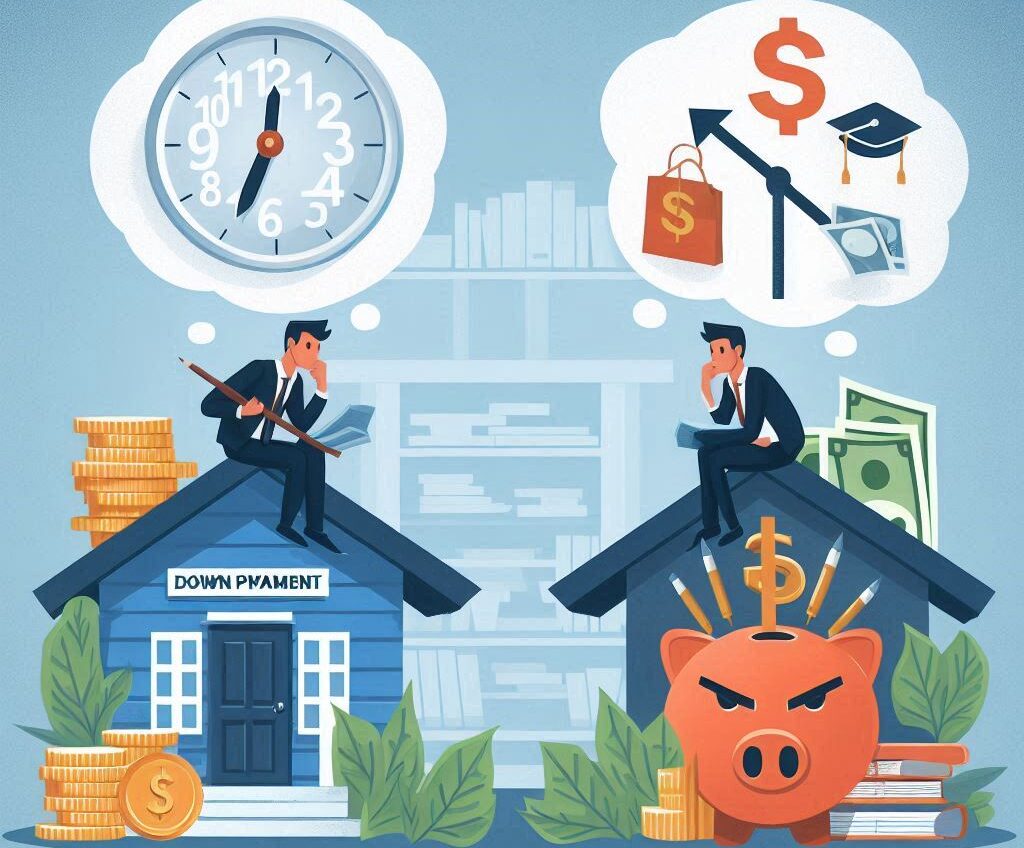If you’re itching to buy your first home but staring down a pile of student loan debt, you’ve got a tough call to make. Do you throw everything at those loans to clear them fast, stash cash for a down payment, or somehow juggle both? It’s a financial tug-of-war, but with some smart moves, you can find a balance that works.
Why It’s Worth Thinking About
- Knocking out student loans early cuts the interest you’ll pay over time.
- But home prices keep climbing, and student loans often carry lower rates than other debts.
- With a little discipline, you might not have to pick—just play it right.
Why Save for a Down Payment First?
Putting a home at the top of your list has its perks:
- Owning Can Beat Renting: Depending on where you live and what you buy, a mortgage might cost less monthly than rent—especially if prices or interest rates jump while you’re waiting.
- Student Loans Aren’t the Worst Debt: They usually come with long payback periods and lower rates compared to, say, credit cards. Holding off on extra payments might not sting as much as you think.
- A Bigger Down Payment Saves Later: The more you put down, the less you’ll borrow—and pay in mortgage interest. That could outweigh the cost of a low-rate student loan.
- Forgiveness or Flexibility: You might qualify for loan forgiveness or an income-driven plan to shrink those monthly payments, freeing up cash for a house.
Why Pay Off Student Loans First?
On the flip side, clearing that debt ASAP has its own pull:
- Interest Adds Up: The longer you carry student loans, the more you fork over in interest—especially if rates are high or variable and creeping up.
- Clean Slate, Better Credit: Wiping out loans erases them from your credit report. They don’t tank your score much, but less debt can still look good to mortgage lenders.
- Mental Freedom: Debt weighs on people differently—some want it gone before taking on a house payment, and there’s no price tag on that peace of mind.
- Tax Perk: You can deduct up to $2,500 of student loan interest yearly, softening the blow a bit.
Watch Out
Skipping payments via deferment or forbearance? Bad move unless you’re desperate. Interest keeps piling up, even if your credit stays clean.
Why Not Both?
Good news: you don’t always have to choose. With some hustle, you can chip away at loans and save for a home. Here’s how:
- Map Out Your Debts
List everything—student loans, car payments, credit cards. Note the balance, interest rate, and minimum payment for each. Knowledge is power. - Attack High-Interest Debt First
Pour extra cash into the priciest loan (highest rate), while covering minimums on the rest. Once it’s gone, roll that payment into the next debt. If you’re drowning, pause the home dream and get relief—lenders won’t care about your down payment if you can’t handle monthly bills. - Stash Savings Somewhere Safe
Open a high-yield savings account (online banks often beat brick-and-mortar rates) or an investment account for bigger returns. Just know investing’s a gamble—don’t cry if the market dips. - Rework Your Loans
Refinance or consolidate student loans for a lower rate or payment. Check if an income-driven plan fits—though heads-up, it might not help your debt-to-income ratio for a mortgage. Any savings? Funnel it to your down payment.
Bonus Tip
Don’t skip the essentials: build an emergency fund (three to six months’ worth) and max out any 401(k) match from your job. Separate accounts keep it tidy.
How Much for a Down Payment?
For a conventional loan without private mortgage insurance (PMI), aim for 20% of the home’s price—PMI tacks on 0.3% to 1.5% yearly if you fall short. FHA loans need just 3.5% down but come with higher rates and insurance. VA loans? Zero down if you’re eligible (vets, take note). Low-down options like the Conventional 97 (borrow 97% of the home’s value) exist too, if you qualify.
Pro Move
Set up auto-transfers from your paycheck to savings—it’s like paying a bill you can’t skip.
Savings Hacks to Get There Faster
- Automate It: Direct deposit or recurring transfers build your stash without thinking.
- Bank the Extras: Tax refunds, bonuses, or birthday cash? Straight to savings, no detours.
- Trim the Fat: Cut back on takeout, streaming subscriptions, or that pricey weekend trip. Living with family temporarily (with rent, if they’re cool with it) can turbocharge your savings.
- Side Hustle: A part-time gig, a raise, or overtime hours can pad your fund fast.
FAQs
How Do I Kick Off Saving for a House?
Commit. Set up an auto-transfer to a dedicated savings account and treat it like a must-pay bill.
House or Loans—Which Comes First?
Depends on you. Weigh your goals, timeline, and cash flow. High loan rates? Maybe tackle those. Rent skyrocketing? A house might win.
Should I Pay Off My Loans?
Yes, eventually—it’ll save you interest long-term. Refinancing or consolidating can lighten the load while you save.
The Bottom Line
You don’t always have to pick between a down payment and student loans—plenty of folks pull off both. Life shifts, though, so what’s tricky today might be doable next year. Keep checking in on your finances, tweak your plan as needed, and stay the course. A home and a debt-free future? They’re worth the grind.

